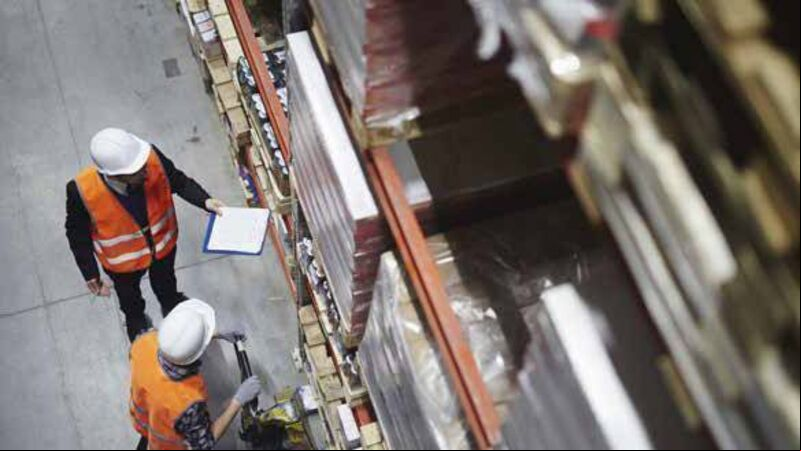Irish companies must be ready for added responsibilities as importers

From January 1, 2021, it may no longer be a straightforward process to source goods and products from Great Britain. HSA and INAB urge companies to be prepared to ensure continued and complaint trade.
The Health and Safety Authority has a key role in market surveillance and has responsibility for ensuring the safety of products used in workplaces and used by consumers.
In that regard, the HSA checks the Irish market for unsafe products and articles, thereby allowing for international movement and trade of goods manufactured in Ireland. The Irish National Accreditation Board (INAB) has responsibility for the accreditation of laboratories, certification and inspection bodies.
Both the HSA and INAB are preparing for the impacts that the UK withdrawal will have on Irish businesses and are ensuring that all affected have the relevant information to assist them with their preparations.
The permanent consequences that Brexit will bring about for many Irish businesses are now clear and imminent. Continued direct trade with companies based in Great Britain (England, Scotland and Wales) from 1 January 2021 onwards, will bring added paperwork and the need to meet more legal requirements all of which requires immediate careful consideration by Irish companies. It may no longer be a straightforward process to source goods and products from Great Britain. To assist Irish companies consider what they may need to do in order to be ready, the Health and Safety Authority (HSA) has advice for companies importing chemicals, machinery, transportable pressure equipment from Great Britain and for those who rely on certification from notified bodies.
One of the key impacted areas is that of chemical products sourced in Great Britain (GB), for example, cleaning products, paints, degreasers, varnishes etc. Irish companies who bring in chemicals from GB are currently either distributors who distribute the chemicals onwards to their customers or downstream s who use the chemicals themselves, or perhaps mix them to produce a new product. Such companies who intend to continue to buy chemicals from GB suppliers from 1 January 2021 should be aware that their role in the supply chain will change to that of an EU importer.
With the change in role, comes the added responsibilities for ensuring that chemical products are compliant with EU regulations and that essential safety information on the chemicals is correct and available for their workers and their customers. Importers must make sure that hazard labelling and packaging and safety data sheets provide the correct information for safe use. They are also responsible, for example, for making sure that chemical products do not contain any substance that are restricted or banned for use in the EU.
The requirement to chemical substances imported from GB from 1 January 2021 under the REACH Regulation is possibly the most onerous task potentially facing Irish chemical companies. There are a number of options available both to the Irish companies and/or to their GB supplier that would reduce the regulatory burden post-Brexit. For the Irish company, the options include changing their supplier to an EU-27/EEA one, or depending on the supply chain, relying on an exemption from registration for re-imported substances. Options available to the GB supplier will depend on what role they currently have regarding REACH; they may transfer their REACH registrations to an EU entity for example, or appoint an Only Representative in the EU to complete the registrations on their behalf.
While the remaining time is now very tight for those companies who have not determined the impact of Brexit on their future supply of chemicals from GB, it is crucial that these companies their UK supplier now to determine their plans post-Brexit. They need to examine all of their options, to ensure that they can continue to legally place these chemicals on the EU market come 1 January 2021.
Importing chemicals is not the only aspect to consider. From the 1 January 2021, an Irish company exporting to GB any of the chemicals named in the Regulation concerning export and import of hazardous chemicals is required to notify the export at least 35 days prior to the expected date of export. Additionally, an explicit consent from GB may be required for some chemicals prior to export.
Companies who buy their chemicals from Northern Ireland will not need to make any changes to how they work, as the chemical regulations will apply in Northern Ireland as elsewhere in the EU, as per the Ireland/Northern Ireland Protocol.
The Health and Safety Authority is also the Competent Authority for the market surveillance of industrial products in the market place; these products include machinery, pressure equipment, gas appliances (commercial), lifts, ATEX equipment and personal protective equipment (PPE). These industrial products for sale or distribution on the EU markets must comply with the relevant EU directives/regulations and national legislation. The regulations place duties on economic operators such as manufacturers, authorised representatives, importers and distributors to ensure the product is manufactured to the required standards and safe for use by the end when being placed on the market. Inspectors from the HSA carry out checks and inspections to ensure products being placed on the EU market are in compliance with these standards.
At the end of the transition period, such products manufactured in Great Britain will undergo specific checks to ensure that they are in compliance with EU regulations and standards before they can be placed on the EU market. EU accredited notified bodies must be used where required on certain products. Irish companies currently distributing products manufactured in Great Britain (or in transit through GB from outside the EU) for distribution within Ireland or the EU may become an importer after 1 January 2021. This will place additional responsibilities on companies to ensure products are to the required standards.
Under the Protocol on Ireland and Northern Ireland, goods / products from NI once manufactured to the required standards, in compliance with EU legislation, (including use of an EU Notified Body as required for specific products), with a Declaration of Conformity and CE mark, can be placed on the EU market.
Irish economic operators dealing with Great Britain, (to ensure no disruption to the supply chain), should ensure that they are prepared for the changes in responsibilities that may occur from 1 January 2021. Additional information can be found at: https://www.hsa.ie/eng/topics/market_surveillance/.
Transportable pressure equipment (TPE) is another area where Irish companies need to consider impacts on their business. Irish distributors of TPE coming from the UK should know that their role as an economic operator under the TPE Directive will change to importer and thus their obligations will change from 1 January 2021. Irish companies that presently use a UK notified body to carry out inspections of TPE (periodic inspections, intermediate inspections and exceptional checks), will need to use an EU notified body from 1 January 2021 to ensure the continued free movement of the TPE. There are particular rules that will apply to TPE under the Protocol on Ireland/Northern Ireland. TPE placed on the market in Northern Ireland will have to comply with the TPE Directive. Where TPE is certified by a notified body in Northern Ireland, it will need to be marked with “UK(NI)” next to the Pi-mark showing that it can legally be placed on the market in Northern Ireland but not in the EU. Reports of inspections issued by an EU notified body will be valid in Northern Ireland, which means that TPE can be used in Northern Ireland based on these reports. In the case of reports of inspections issued by notified bodies in Northern Ireland, these will be valid only in Northern Ireland and will not be valid in the EU. Reports of inspections issued by notified bodies in GB will not be valid in Northern Ireland.
Currently, some Irish manufacturers rely on the services of notified bodies based in the UK. Companies currently using UK-based notified bodies, to carry out conformity assessments and inspections, will have to source alternative bodies from within the EU. Since the UK’s decision to leave the European Union, INAB, which is part of the Health and Safety Authority, has experienced significant growth in applications from organisations re-locating from the UK requiring accreditation. In of accreditation INAB, provides accreditation to applicant conformity assessment bodies (CAB’s) which test, certify and inspect products/services. Apart from meeting the requirements of accreditation and notifying authorities, CAB’s must demonstrate they are permanently established in Ireland.
While Brexit leaves many unanswered questions for many sectors it is essential for Irish businesses who source or supply products from or to Great Britain to consider the implications and plan their way forward accordingly. Irish companies are now strongly advised to speak to their GB supplier and ask them about their plans post-Brexit.
The HSA provides to Irish business and companies with particular concerns or questions can visit their website at https://www.hsa.ie/Brexit or the HSA or INAB by phone 1890 289 389 or by emailing [email protected], [email protected] or [email protected].






